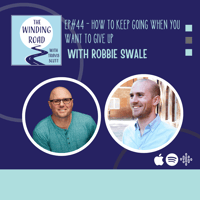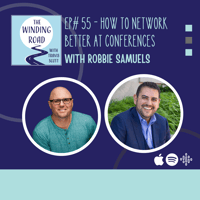How to keep going when you want to give up. That’s what many of us want to know when we’re in the...
How to Market Yourself: First, It's Important to Know Who You Are
Knowing who you are is more important than focusing on what you do and who you’re for.
 Photo by Jeremy Vessey on Unsplash
Photo by Jeremy Vessey on Unsplash
Knowing who you are may seem obvious. You know who you are because you're you, right?
Maybe. But maybe not.
Knowing who you are can ultimately affect the work you do and the people you seek to serve, both positively and negatively.
When I think of who I am when it relates to the work I do, I consider three things:
- My values
- My experience
- My interests
We all have these three things. Yet, often, we don't reflect on them when we're starting a business or seeking a career pivot? Why is that?
Maybe it's because we're too focused on the 'prize' of money. We need to pay our rent or mortgage; we must eat, so we focus on what we need in the short-term, and that's money.
We also, focus (consciously or subconsciously) on the dopamine hit we receive when someone says 'yes' to the proposal we’ve sent to a prospective client.
It's not until we start working with these clients that we realize we've neglected to consider how they align with our values, experience, and interests.
Values
This, to me, is the big one. There may be times when our experience doesn't quite align with a project we're working on, but we can figure it out. This may make the project more difficult or less enjoyable, but we can often move past this and chalk it up to a learning experience.
Even if we cannot align every role or project to our interests, values are often non-negotiable. You're going to be miserable if there's a misalignment of your values and those of your client or the company you work for.
There's also a chance that your connection with that client, company, or project could lead others to assume you have the same values as they do. This can negatively affect you if they have a terrible reputation in the market.
This happened to me once. Two of my core values are integrity and respect.
Many years ago, when I was consulting, I worked on a project with a company, and things were going well in the beginning. After a while, I could begin to sense a lack of respect for my time and expertise. Instead of a trusted advisor and colleague, they began to treat me as if I were an employee and cog. This bothered me, but I continued on with the project.
It wasn't until I spoke with some friends and former colleagues that I found out about their bad reputation in their industry.
This didn't sit well with me, and I removed myself from the project shortly after.
It's always challenging to decide to end a project or relationship and say 'no' to the business. But hanging on can cause more long-term damage not only to your reputation but to your own self-worth and image of yourself.
That's why it's vitally important to take an inventory of your values and keep them in mind when considering a job offer from a company or taking on a new project if you're a consultant.
Experience
Not long ago, a recent grad came to me for advice. She had been doing freelance design work and wanted to gain more experience. She had been asked about taking on projects in which she wasn’t very experienced or knowledgeable and she would turn them down.
I suggested that she start saying ‘yes’ to these and see what happens. I recommended that she use it as an opportunity to learn and figure it out. Afterall, that’s what I did when I first got into digital marketing.
It’s scary but you would be amazed at what you’re able to do.
Several weeks later, she reached out to tell me she did this very thing. Someone approached her about some design work she didn’t have much experience around. She decided to leap and say ‘yes.’ She went on to tell me that she was having a blast with the project and the client had recently offered to pay her more than what they had agreed upon.
Experience is the basis of what you're providing as an employee or consultant. This is also where you may discount your value and try to compare what you've done and what you know to others- similar to the anecdote I just shared.
That's a pointless exercise. You may have done some of the same things as other people, but they haven't done them at the companies you've worked at, with the people you've collaborated with, in the time that you've done it.
That makes a difference and provides you with your own unique perspective.
When thinking about your experience and how it relates to a new role or project, it's crucial to think about the things I just mentioned. How do they give you the ability to offer something unique and beneficial? How well does your experience align you to the project or role you're exploring?
Will you be bored? Will you be challenged just enough to come away better than you went in? (Hint: that's a great place to be) Or will you be so far over your head that it will cause you stress and the possibility of failing miserably?
There have been times where I've taken on projects that were too basic and I quickly became bored, counting down the days until the project was over.
A few times, I've gotten into projects that were way over my head and stumbled through. In one instance, I realized this was the case and was transparent with my client. Luckily, I knew someone experienced in that particular area and made the introduction to keep the project moving forward.
It can be tough to know when something may be a challenging and growth opportunity versus getting in over your head, but you'll know. You'll feel fear and self-doubt, but don't let that get in the way of taking on a project that will help your client or company and help you grow.
In my opinion, you should always come away with more than you went in with. Always.
Let fear be your compass. It usually points where you need to go.
Interests
Aligning your projects or the company you work for with your interests may be difficult to do, depending on your situation, the economy, and other factors. Still, it's something you consider and strive for whenever possible.
Working for a company or in a market that you're knowledgeable and interested in can be massively rewarding.
It can help you make sense of everything because you understand it, you know how it works, and, most of all, you enjoy it.
You'll often do your best work when you enjoy what you're doing and feel like you understand it. Understanding the market or industry is one less thing you have to learn when you start a new role or project.
You can even work for a company you're interested in, in a market you understand and be put into a role that does not align with your interests.
This continuously happened throughout my recruiting career. I was a tech recruiter and focused mostly on hiring software engineers. Don't get me wrong, that's a great place to be, especially when the economy tanks. Companies are always hiring engineers.
But I've never been an engineer, I never wanted to be an engineer, and the field did not interest me at all.
And, despite working at Microsoft, a company I admire and understand, this was difficult because I needed to learn about things I had no interest in and talk daily with people that, for the most part, I had nothing in common with.
It was brutal.
Contrast that to when I've been able to recruit for marketing-related roles. It was a completely different experience. Much more enjoyable. Much easier for me to understand what someone did and if they would be able to do the job they would be hired into.
Conclusion
In conclusion, understanding what you do (or what you're for) and who you're for is vitally important to your success as an employee and especially as a consultant. However, doing the work will either be enjoyable and productive or a slog if you don't consider and take into account who you are before moving forward.
-1.png?width=500&height=125&name=Website%20Logo%20-%20400x100%20(transparent%20background)-1.png)


